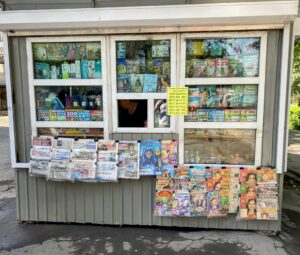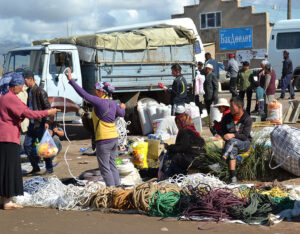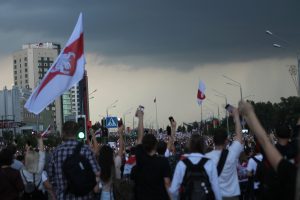European National Policies Series – The Netherlands and Central Asia

Download “European National Policies Series - The Netherlands and Central Asia”
The Netherlands increasingly acknow-ledges the vital geostrategic importance of the Central Asian region and has adopted a multidimensional approach that reflects this standpoint. Dutch political and security relations with Central Asia are largely determined through multilateral diplomatic channels. Its trade and energy ties with Central Asia are mainly established via bilateral relations, but also follow European Union (EU) policy. Trade is largely concentrated with Kazakhstan and since 2005 the Netherlands has been the largest contributor to Kazakhstan’s Foreign Direct Investment (FDI). Development assistance is usually allocated through multilateral channels. Bilateral ties with Kyrgyzstan and Tajikistan in the field of trade are scarce and the multilateral instruments of the EU determine political relations with these two countries. Political relations with Uzbekistan and Turkmenistan are limited, while development assistance to both countries is non-existent.
The Netherlands is bilaterally less involved in the Central Asian region than large EU member states such as the United Kingdom and Germany, but it is more involved than the smaller and most medium-sized EU countries. The Netherlands attaches strong importance to the values of democracy, human rights, good governance and the rule of law, regarding them a vehicle of stability for the region. The Netherlands has taken a proactive approach in promoting these values, adopting a multifaceted approach via the EU and the Organisation for Security and Co-operation in Europe (OSCE), as a starting point.
Political relations and values
Since the collapse of the Soviet Union, the Netherlands has endeavoured to strengthen diplomatic relations with Central Asian states in light of new strategic interests. The geopolitical significance of the region has meant that strong political relations are of importance, especially with the region’s energy exporting economies. As a consequence of this, the Netherlands adopts a multidimensional approach choosing to pursue strong bilateral relations with Central Asian states such as Kazakhstan and the use of EU diplomatic channels with Central Asia as a whole. The Netherlands has an embassy in the Kazakh capital, Astana, which is also responsible for Kyrgyzstan (where an honorary consul is too based) and Tajikistan. Honorary consulates in Uzbekistan and Turkmenistan fall under the Embassy in Moscow.
The Netherlands’ view is that by acting in conjunction with the EU there is a greater chance of political, economic and social stability being successfully secured in this region. The Netherlands attaches special importance to the promotion of democracy, human rights, good governance and the rule of law in Central Asia, holding them as instrumental to the stability of the region. In this regard the Netherlands has taken a proactive approach in promoting these values. One such example is the ‘Central Asia Human Rights and Good Governance Programme’; an initiative from the Netherlands’ Kazakh embassy seeking to support financially non-governmental organisations (NGOs) and groups working in such areas in Kazakhstan, Kyrgyzstan and Tajikistan(1).
As a result of such growing interest in Central Asia, there has been a series of bilateral meetings between Central Asian and Dutch officials. The strongest bilateral tie is maintained with Kazakhstan, with relations and regular exchanges dating back to September 1992. In May 2010, the Kazakh Minister of Transport and Communications, Abelgazi Kussainov, met with the Crown Prince of the Netherlands, Willem-Alexander, while also participating in the coinciding 17th World Congress on Information Technology, in turn hosted in Amsterdam. 18 months later, Timur Kulibayev, then Chairman of the large Kazakh investment fund Samryk Kazina, too visited the Crown Prince of the Netherlands. Until 2012 the Netherlands offered a training programme for young diplomats from Central Asia, funded by the Netherlands’ Ministry of Foreign Affairs.
Trade and energy
Kazakhstan is by far the Netherlands’ most important trading partner in Central Asia. In 2010, total Dutch imports from Kazakhstan amounted to €875 million, of which 90 percent consisted of natural resources (oil, gas, cokes and coal). In the same year, exports to Kazakhstan were €360 million, of which 60 percent consisted of machinery, such as production lines, generators and electrical appliances.
Trade with the other four countries in Central Asia is much smaller. Overall trade with Uzbekistan amounted to €58 million in 2010, and with Turkmenistan, €45 million in the same year. Total trade flows with Kyrgyzstan and Tajikistan amounted to €19 million and €6 million respectively. Furthermore, approximately 90 percent of the overall trade between the Netherlands and Central Asia in 2010 was directed to Kazakhstan – an indicator of the importance of Dutch-Kazakh trade relations(2).
Since 2005 the Netherlands has been the largest contributor to Kazakhstan’s foreign direct investment (FDI). It invested $5.8 billion in 2010, a third of total FDI. These figures however do warrant further elaboration. The Netherlands and Kazakhstan agreed on a lucrative tax and investment treaty in 1997, which made it relatively easy for multinationals to work through Dutch holding companies when deciding to invest in Kazakhstan. Transnational business giants like Coca Cola, the Italian oil company ENI and Russian Lukoil take advantage of the favourability of this ‘Dutch holding construction’. This indeed explains in part the enormous share of the total FDI in Kazakhstan for a small country like the Netherlands. Dutch multinationals like ABN AMRO and Royal Dutch Shell also utilise the same holding construction. Many smaller Dutch companies are also active in Kazakhstan. Their work varies from mining and agricultural development to engineering, dredging and transport. The Netherlands-Kazakhstan centre for trade promotion, part of the Netherlands council of trade promotion, was established with the aim to connect Dutch and Kazakh entrepreneurs, improving their knowledge and informing Dutch companies about the Kazakh investment climate(3).
The largest Dutch company active in the Central Asian region is Royal Dutch Shell. Kazakhstan is especially interesting for Shell since there remain numerous large untouched oil fields. Shell is currently part of the North Caspian Operating Company (NCOC) together with Exxon, Total, ENI, and Kaz Munaigaz, the National Kazakh company. This consortium tries to extract one of the most difficult oil fields in the world: The Kashagan field, which lies under a lake that stays frozen five months a year. Although there have been several delays, according to the current time frame the aim is to reach a production of 450,000 barrels a day by 2016(4).
As a Dutch foreign affairs official pointed out, the Netherlands supports the position of the EU in the development of the Southern Corridor, which will link Europe to important oil and gas suppliers across the Caspian Sea. The objective is to diversify Europe’s energy supply and to secure the stability of energy markets in the EU and in the neighbouring countries. The Netherlands does not have a specific interest in either option for the Southern Corridor. Ultimately, the choice for a specific project (Nabucco, TANAP, etc.) will be dependent on available funding and on the market stakeholders. Development of the trans-Caspian route will be essential to unlock the energy reserves from across the Caspian Sea for the European markets. Financial feasibility of such a route depends on projections for the demand of gas in Europe. The energy demand in Europe currently remains stable, whilst the legal hurdles concerning the development of a trans-Caspian route remain unresolved.
Aside from looking to diversify energy supply through the Southern Corridor, the Netherlands cooperates with Russia and other EU countries at the same time in the development of Nord Stream, an offshore natural gas pipeline. The Dutch natural gas infrastructure and transport company, Gasunie has a nine percent stake in Nord Stream. Next to these growing trade and energy ties with Russia, the Netherlands and other EU countries increasingly acknowledge the significance of Turkmenistan and its vast gas reserves.
Security
Security in Central Asia is also of concern for the Netherlands. This region has unfortunately been known for its frequent bouts of instability and political unrest, routinely with dire consequences for both the people and owing to its symbiotic relationship with the region, the whole of Central Asia and beyond. As the Netherlands has strong investment ties in Kazakhstan, security for these investments is a primary concern and stability in the region presents good opportunities for investment and business. This is one reason why the Netherlands is keen to see stability in the whole Central Asian region. The Netherlands also contributes to the EU’s stability initiatives, including the EU-financed and United Nations Development Programme (UNDP) implemented Border Management programme in Central Asia (BOMCA). A much earlier clear demonstration of the Netherlands’ intention of acting upon this concern came when the Dutch held the chairmanship of the OSCE in 2003. The Netherlands used this opportunity to steer the OSCE into enhancing its activities on comprehensive security increasingly to the Central Asian region. The Netherlands also financially supports the OSCE border management staff college, which trains border security staff from OSCE-participating states and promotes cooperation between OSCE states and partner countries, and was launched in Dushanbe on 27 May 2009.
Instability in Central Asia is primarily a concern for the states in close proximity to the region, such as Russia, China and Afghanistan. Instability in the region would affect the Netherlands mostly indirectly but meanwhile, shipment of drugs from Afghanistan through Central Asia does affect the Netherlands directly.
As the Netherlands is an active member of NATO, concerns pertaining to security matters in Central Asia must take into account the security situation in Afghanistan. Since the withdrawal of Dutch troops from Afghanistan in August 2010, the Netherlands’ mission now consists of the implementation of a substantial training programme for the Afghan civilian police. The Netherlands has personnel stationed in the Kunduz province and Kabul and an F16 detachment is based in Mazar-i-Sharif, which provides air support for the police training mission. The Netherlands believes that providing a stable security situation in Afghanistan will have a positive bearing on Central Asia and the broader region, especially bearing in mind possible negative consequences of NATO troop withdrawal up to 2014.
When it comes to the issue of hard security, the Netherlands’ involvement is minimal. The Netherlands has used the United States’ Air Force transit centre in Manas, Kyrgyzstan, which was set up to support operations in Afghanistan. Apart from this use during Afghanistan operations, hard security matters or military cooperation with Central Asian armed forces is largely non-existent.
The Netherlands is however particularly involved in soft security initiatives. One such area of note is Security Sector Reform (SSR). The Dutch government’s financing of an SSR training project organised by the CESS makes a further good example. The project’s main focus was to improve democratic governance and monitoring of Kazakhstan’s security sector by providing training courses for officials and civil society leaders, and concluded with a high level conference in September 2009, with participants from most Central Asian states, Europe, the United States, Russia and organisations that included the Shanghai Cooperation Organisation (SCO) and NATO.(5) Kazakhstan also aspires to transform Central Asia into a nuclear-free zone and the Netherlands, in cooperation with the United States, endorses this effort by conducting a project on nuclear safety in Central Asia.
Development assistance
Dutch development assistance is the responsibility of the Directorate General for International Cooperation (DGIS) of the ministry of foreign affairs. In 2011, the Dutch government decided to reduce from 33 to 15 the number of partner countries with whom the Netherlands has a bilateral development partnership. Around one quarter of the Dutch development budget currently goes to these 15 countries; the larger part goes to World Bank, UNDP, the United Nation’s Children’s Fund (UNICEF) and directly to several NGOs working in the development field. The private sector is also acquiring a stronger role in development cooperation by funding development projects out of their own pocket in the framework of corporate social responsibility programmes. Eventually such companies’ business view is to strengthen their position in developing countries.
The five Central Asian countries are not part of the selected group of 15, therefore developmental assistance to these countries is mainly provided through multilateral channels and NGOs. The Embassy in Astana supports a few small projects aimed at human rights, democratisation and poverty reduction. These funds are reserved for local civil society organisations, not only in Kazakhstan but also in Kyrgyzstan and Tajikistan.
In the context of development assistance, the Netherlands devotes specific importance to human rights issues, good governance and the improvement of the business climate. The Netherlands has some funds available to support the improvement of the human rights situation in Kazakhstan through NGOs and a pilot project in Kazakhstan focusing on the freedom of religion. One official in the Netherlands’ Ministry of Foreign Affairs mentioned that corporate social responsibility initiatives in Kazakhstan would commence this year. Meanwhile, small bilateral programmes are supported in Kyrgyzstan and Tajikistan through NGOs aiming to improve the human rights situation. The Dutch cultural fund ‘Prins Claus Fonds’ finds its way regularly to Central Asia to support artists and cultural institutions.
The Netherlands, as many other countries and international organisations, identifies a clear link between security and development. This nexus centres on the presumption that the two concepts influence each other. When security and stability are guaranteed, people are more confident and have more room to further develop their lives and the country in general, while an increase in development in turn often spurs on greater stability and security. An example in which the Netherlands acknowledges this nexus can be seen in a project in Tajikistan,where attempts are made to stop drug trafficking in Central Asia by providing farmers with alternative sources of income.
The Netherlands liaises closely with EU development assistance efforts in Central Asia and streamlines carefully its own policies with the EU’s development cooperation instrument – the instrument for stability and the European Instrument for Democracy and Human Rights (EIDHR).
Conclusion
The Netherlands has adopted a multidimensional approach towards Central Asia, while focusing specifically on universal values such as democracy, human rights, good governance and the rule of law. The Netherlands adopts a realistic approach in this vein by acknowledging that its political leverage on such values is much higher when it is acting in conjunction with the policy of the EU, NATO and the OSCE.
Next to this focus on the multilateral diplomatic channels, in the context of political relations and security, the Netherlands has developed strong bilateral ties especially with Kazakhstan in the field of trade and energy. The Netherlands is also quite active in the region in its provision of development assistance, but this is principally allocated via larger multilateral funds or through small embassy funding for local NGO projects. Relations with Uzbekistan and Turkmenistan in all relevant foreign policy fields are limited.The Netherlands hopes that by closely cooperating, bilaterally and multilaterally, with Central Asian countries on political relations, security, and development, but especially in the field of trade and energy, the region will become more prosperous so that it can successfully meet challenges to its stability and security.
- Netherlands Embassy in Astana and the economic division in Almaty, Kazakhstan, Grantees 2010.
http://kazakhstan.nlembassy.org/services/human-rights-and-political-affairs/central-asia-human-rights-and-good-governance-programme/2010/grantees-2010.html, accessed 30 March 2012. - Central Bureau of Statistics of the Netherlands (CBS), International trade and exports to countries according to SITC classification, 31 July 2012.
http://statline.cbs.nl/StatWeb/publication/?DM=SLNL&PA=81266NED&D1=1&D2=a&D3=119,121,179,220,232&D4=12,25,38,l&HDR=G2,T&STB=G1,G3&VW=T, accessed 16 May 2012. - G. de Groot & S. Eikelenboom, ‘Nederland spil van Kazakse investeringen’, Financieele Dagblad, 27 June 2012.
- Bloomberg, Biggest find in decades becomes $39 Billion Cautionary Tale, 17 November 2011, http://www.bloomberg.com/news/2011-11-16/biggest-oil-find-in-decades-becomes-39-billion-cautionary-tale.html, accessed 15 May 2012.
- Merijn Hartog (ed), Security Sector Reform in Central Asia: Exploring Needs and Possibilities (Groningen, CESS, 2010, Greenwood Paper 25) http://www.cess.org/publications/papers/view/?id=27.
Download “European National Policies Series - The Netherlands and Central Asia”
EUCAM-National-Policies-Brief-6.pdf – Downloaded 326 times – 1.19 MB






